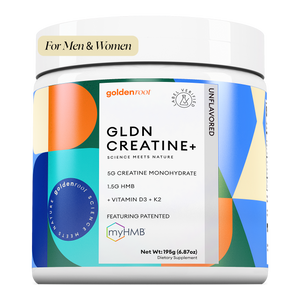For best results, drink at least 3-4 liters (12-16 cups) of water per day while using creatine. Pair every 5g dose with at least 375 mL (12 oz) of water to help with absorption, hydration, and performance.
Why Hydration Is Essential When Supplementing with Creatine
Creatine enhances strength, supports lean muscle growth, and boosts workout performance. But to unlock its full potential, water plays a central role. Creatine draws water into muscle cells to support cellular energy production (ATP) and protein synthesis. Without enough hydration, your body may struggle to utilize creatine effectively.
Hydration is not a bonus here; it’s part of how creatine works!
Read more: Creatine Before and After: What Results Can You Expect (With or Without Loading Phase)?
How to Take Creatine with Water (and Why It Matters)
Creatine is held in muscles as phosphocreatine and helps regenerate ATP, the primary energy molecule used during high-intensity movements. This means better energy, strength, and recovery for your workouts.
Water supports the hydrolytic breakdown of creatine phosphate to produce ATP. It also helps transport nutrients, flush out waste (like creatinine), and enhances the cell-volumizing effect (where water is drawn into muscle cells for strength and fullness).
GLDN Creatine + HMB goes a step further by combining 5g of creatine monohydrate with patented myHMB®, plus vitamins D3 and K2.
This unique formula:
- Supports performance
- protects against muscle loss
- promotes bone health.
How Much Water Should You Drink on Creatine?
General Guidelines
Aim for 3-4 liters (12-16 cups) of water per day when supplementing with creatine.
Dosage Considerations
-
Mix each 5g scoop of creatine with at least 8 to 12 oz (240 to 375 mL) of water.
- Tip: Use a creatine water intake calculator to personalize your hydration target based on weight and activity level.
Based on Activity Level
- Active adults: 3-4 liters/day
- During loading phase (20g/day): Up to 1 gallon (4 liters)
- Sweaty workouts or hot climates: Increase water intake beyond baseline
Read more: The Synergistic Benefits of Combining Creatine and HMB for GLP-1 Users
What Happens If You Don’t Drink Enough Water with Creatine?
Potential Side Effects
- Muscle cramps
- Bloating or digestive discomfort
- Reduced performance or early fatigue
More Serious Risks
In rare cases, lack of hydration may contribute to kidney stress or blood thickening (thrombosis).
Signs of Dehydration
- Dark yellow or strong-smelling urine
- Dry mouth and lips
- Headaches or dizziness
Read more: Creatine: Not Just for Muscles, A Boost for Your Brain Too
Practical Tips for Meeting Your Daily Water Intake
Daily Hydration Habits
- Carry a refillable bottle and take small sips throughout the day.
- Don’t wait until you’re thirsty; stay ahead of dehydration.
Use Smart Tools
- Try hydration tracking apps or set phone reminders
- Consider a water intake calculator or a smart water bottle
Diet & Lifestyle Adjustments
- Add water-rich foods: cucumbers, watermelon, oranges
- Avoid too much caffeine and alcohol (they’re diuretics)
- Include electrolytes during intense training sessions
Read more: is creatine safe while breastfeeding
Conclusion
No matter which Creatine formula you take, hydration is very important and key. Creatine works by enhancing energy, strength, and recovery, but only when your body has enough water to do its part.
Prioritize 3-4 liters of water daily, increase during intense training or loading phases, and listen to your body’s cues. Creatine is powerful, but water is the partner that makes it work.
References & Sources



